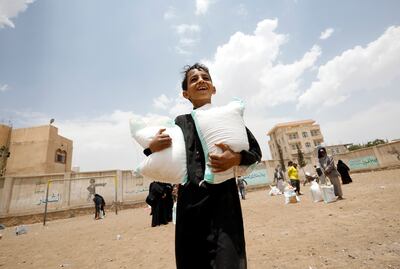Today, the UN marks its 22nd International Youth Day under the theme "Transforming Food Systems: Youth Innovation for Human and Planetary Health". The occasion aims to shed light on issues that affect young people around the world and invite leaders to engage them in developing viable solutions.
According to the UN, the global population is set to rise by 2 billion over the next 30 years. This will lead to a drastic spike in the demand for food. However, climate change poses a significant threat, as increasing temperatures have a negative effect on the growth and survival of food sources – both plant as well as animal-based sources.
The second Sustainable Development Goal, one of the 17 outlined by the UN in 2015, is zero hunger by 2030. Six years after the setting of the goals, rising temperatures across the world have jeopardised global yields of agriculture. The world is also still working to combat the consequences of Covid-19 – and one of the most dire outcomes of the pandemic is the surge in global poverty.
Given this scenario, Arab countries must begin planning for these shifts and channel their resources towards practical solutions that will yield positive results and safeguard our future.
Countries in the Middle East have come a long way from being almost completely reliant on oil. In just two years, Arab nations have doubled their capacity to produce renewable energy, according to a report published in 2020 by the UN Development Programme and the Regional Centre for Renewable Energy and Energy Efficiency. However, much more is still required in terms of execution to achieve the desired impact.
The report further notes that all Arab countries have renewables facilities now, up from only four in 2008. Many areas in the region also hold an advantage in terms of solar power due to a higher-than-average supply of peak sunlight compared to other parts of the world.
While these indicators are promising, in the context of agriculture and food security, we must not forget that the Middle East is the most water-stressed region in the world, and only 5 per cent of its land is arable.
This is an exceptional challenge and this is the time to turn to our most valuable asset: brilliant young minds that hold the keys to our future. Youth engagement has been a cornerstone of the rapid development of Arab nations. Our leaders have placed special focus on empowering young people through education, employment, entrepreneurship opportunities and created environments that have fostered their growth. All of these factors have enabled the youth to contribute to national goals.
The Arab world has diverse, educated and highly capable talent. We must take urgent action to involve these bright minds to build sustainable food systems that will serve our region’s populations for years to come.
National programmes have catalysed progress in several Arab countries, including in the UAE, Oman and Saudi Arabia. These are useful benchmarks for future goals. A challenge of this scale, however, is best tackled through collaboration among nations.
Government and private sector organisations that operate in areas such as renewables, agriculture, health care and research and development hold high stakes in this matter.

Following the coronavirus outbreak, our youth is now more aware than ever of the importance of solidarity, well-being, preparedness for changes and the need to create sustainable alternatives to existing supply chains.
It is up to the power players in the region to build synergies with young people and form partnerships in the region that will pave the way towards a more secure future.
I cannot overemphasise the significance of empowering youth. It is evident that members of the young Arab generation are well educated, empathetic and informed about global issues. With the right amount of support from large-scale organisations they will be capable of leveraging existing strengths and opportunities to come up with fresh, innovative and feasible solutions for a healthier community and planet.
We have a long road ahead of us. We cannot discount recent setbacks that economies and societies in the Arab region have faced, as has the rest of the world. We have, however, fought adversity in the past. And our people with their undying spirit have always been our greatest strength.
International Youth Day is dedicated to the trailblazers and architects of our region’s future. We must celebrate them and empower them in order to ensure their contribution to the success of our nations.


